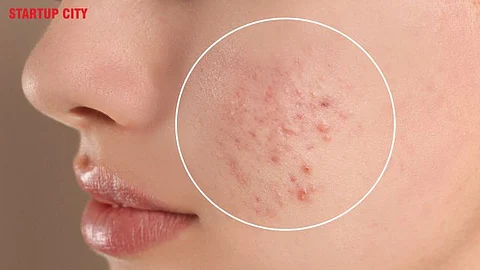

Acne, commonly known as pimples or zits, is a prevalent skin issue that impacts individuals across all age groups, particularly teenagers and young adults. It arises when hair follicles beneath the skin become blocked, resulting in the emergence of lesions on the skin surface.
These lesions can take the form of blackheads, whiteheads, papules, pustules, nodules, or cysts. Although acne typically occurs on the face, it can also appear on the back, chest, and shoulders.
Acne stems primarily from pores becoming clogged due to various factors. Sebum, an oily substance essential for skin moisture, and dead skin cells can combine to block pores. Moreover, bacteria present on the skin can worsen acne by triggering inflammation.
Hormonal fluctuations, especially during puberty, are pivotal in acne formation. Elevated levels of androgen hormones, like testosterone, prompt the sebaceous glands to produce excess sebum, intensifying pore obstruction.
Acne showcases a variety of symptoms, including pimples, papules, blackheads, whiteheads, nodules, and cysts. These lesions can vary in severity, with severe cases possibly resulting in scarring.
Acne appears in different forms, such as cystic acne, hormonal acne, nodular acne, and fungal acne, each necessitating specific treatment approaches.
Fungal acne (pityrosporum folliculitis): Triggered by yeast accumulation in hair follicles, leading to itchy and inflamed bumps.
Cystic acne: Characterised by deep, pus-filled pimples and nodules capable of causing scarring.
Hormonal acne: Associated with hormonal shifts, particularly in adults, causing increased sebum production and pore blockage.
Nodular acne: A severe type of acne characterised by tender, nodular lumps under the skin and visible pimples.
Various elements can trigger or aggravate acne flare-ups. These comprise wearing tight-fitting attire or headwear, exposure to air pollution and excessive humidity, utilisation of oily or greasy skincare products, stress, specific medications, and picking at acne lesions. Some research indicates a correlation between diet and acne, with diets high in sugar possibly worsening symptoms.
A healthcare professional typically conducts a visual assessment to diagnose acne. They may inquire about symptoms, family history, stress levels, and medication usage.
Treatment strategies vary based on acne severity and may encompass topical medications, oral medications, hormone therapy, or supplementary therapies such as steroids, laser treatments, or chemical peels. Antibiotics are frequently prescribed to combat bacteria and alleviate inflammation linked to acne.
Although it may not be entirely preventable, establishing a regular skincare regimen can mitigate the likelihood of acne breakouts.
This involves daily facial cleansing with a mild cleanser, employing oil-free moisturisers, steering clear of comedogenic makeup items, refraining from touching the face, and maintaining good hygiene practices. It's crucial to resist the urge to squeeze or pick at acne lesions to deter scarring.
Several acne treatments, particularly oral and topical medications, might not be suitable for pregnant individuals. It's essential to seek advice from a healthcare provider before initiating any treatment regimen, especially if you're pregnant or planning to conceive. Moreover, patience is vital when addressing acne, as notable improvement may require several weeks or even months.
Acne is a common skin concern that can profoundly affect self-confidence and overall health. Despite its challenges, numerous treatment avenues exist to alleviate acne and deter scarring.
By comprehending the causes, symptoms, and triggers of acne, individuals can proactively address their condition and uphold skin health. Remember, consulting with a healthcare professional is crucial for devising a personalised treatment approach suited to individual requirements and circumstances.